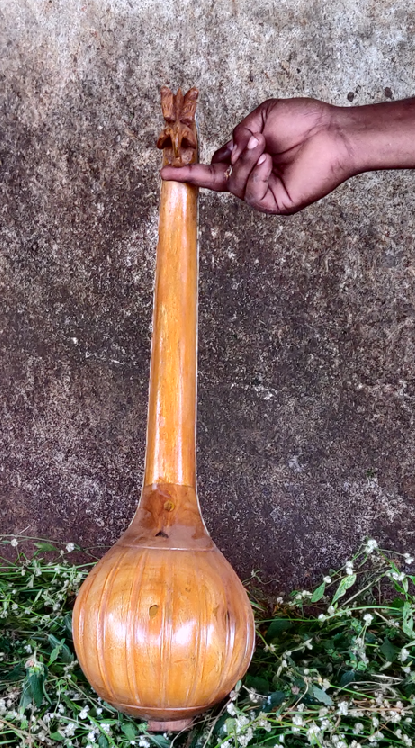Entering the interiors of Simpadipura, a sleepy hamlet about 60 km from Bangalore it is not uncommon to hear the sounds of chisels and hammers striking against wood. Large logs of jackfruit tree wood lying amidst clearings of mahogany and silver oak trees with workers busy carving dome shaped structures from them is a common sight. Mostly youngsters, these men are part of the few remaining families engaged in the craft of veena making. A tradition that has been handed down from one generation to the next, this seemingly non-descript village in Doddaballapura taluk is home to this fading and unique craft.

Veena making is a craft that was introduced here by one Pennoblayya during the 1950s. Manju S P, 40 a craftsman who supplies veenas regularly to stores in Bangalore learnt the art from his father Papanna, 72 who spoke about how he has been making veenas since his childhood. “I have been doing this since the last 60 years and it is a skill I learnt from my uncle Pennoblayya. It was he who learnt the art of making the veena from one Srinivasachar, a Brahmin living in Bangalore” says Papanna. He subsequently bought the craft to this village and passed it on to Papanna and others in his generation. During the heydays there were about 40 families engaged in the craft and this number has been since fast dwindling just like many other handicrafts.

According to Manju it takes about 10-15 days to make a Veena depending on how ornate the work is. Veenas are made from logs of matured jack fruit wood trees. They work about 6-7 hours a day to make the basic body which is supplied to stores mainly in Bangalore.

The final finishing in terms of setting the frets and strings is done by trained musicians. The cost too depends on the level of detailing on the veena. “We have different categories such as the plain veena, one with a simple border, one with moderate detailing using plastic cuttings and one with elaborate carvings” says Umesh, 45 another craftsman who has been building veenas since the last 20 years. He added that the price of their veenas range from INR 10, 000 to 20,000 per piece. On an average each person can make 2-3 veenas a month and typically there are 4-5 people in a family engaged in veena making.


The craft today however, faces several challenges including the difficulty in obtaining old jackfruit tree wood. It is important that the wood is mature and has aged well. “Irrespective of the place of manufacture, a good veena is one that is made from seasoned wood and jackfruit wood works well as it gives the best tonal quality” says Nagarathna, a veena teacher from Bangalore. But availability of the right wood is not easy. “The rising cost and scarcity of matured jackfruit wood is a big challenge as we need logs from trees that are close to hundred years old or more” says Umesh who says that they source it from farmers from across the state.

Given the challenges and the fact that veena making is a skill that is also physically demanding, most of the existing craftsmen have not passed on the craft to their next generation. Most of them work in the service sector and travel everyday back and forth to Bangalore. The depleting number of skilled craftsmen is indeed a reality and a big worry for people selling the veena to end customers. “Earlier, there were many talented veena makers from Simpadipura during my father’s time, but today we have only a handful of them” says Raju, 50, proprietor of 70-year-old Veena Works.

Simpadipura is one of the very few places in south India apart from Thanjavur where the Mysore veena is made. With no support from the Government too, one hopes that it is not a matter of time before the notes of the Veena in Simpadipura fade away.
A detailed version of this article was published in The Khaleej Times.

Very nice article……old tanjavur Veena are best and melodious…..all best classical things are getting outdated…..this new gen is just behind electronic gadgets and no much passion towards anything…..sad part is all classical things are fading away very fast…..classical music learning has gone extremely down….
Thanks Sir! Yes you are right, most of the authentic things are fading away:(